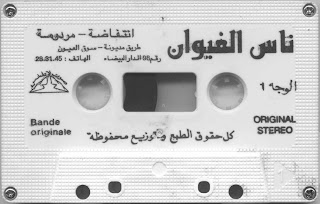
In honor of the pending vote at the UN regarding Palestinian statehood, here's a Nass el Ghiwane tape from around 1992 featuring the song "Intifada", commemorating the then current intifada. This was not the first time Nass el Ghiwane had sung about the situation in Palestine. Their more well-known song on the subject is "Majzara" (popularly known as "Sabra & Shatila") was released 10 years earlier, following the terrible massacres there.
It's unusual for NG to be so explicit when dealing with social and political issues. It's easier for them to do so when they are singing about situations outside of Morocco. When singing about issues within the kingdom, they danced a fine line, using metaphor and oblique references to let their audience know what they were talking about while avoiding running into trouble with the authorities.
This approach was certainly necessary during the reign of Hassan II. Nass el Ghiwane were past their prime of popularity by '92, but there were really no other outlets (to my knowledge) for music with social commentary in those days. Hassan's successor Mohammed VI has made some progressive changes since ascending the throne in 1999, and some avenues for music addressing social themes seem to have opened up for Moroccan hip-hop and fusion artists. However, artists can only go so far in what they say for, like his father, the present king does not tolerate direct criticism of his policies from journalists or musicians.
1) Intifada
2) Mardouma
3) Dallal
4) Limadha ya Karama
Get it here.
---
UPDATE 2023:
YouTube:







